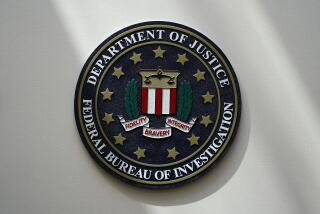U.S. Says Plot on Mission in Pakistan Was Foiled
- Share via
WASHINGTON — U.S. officials said Friday that they had thwarted an Al Qaeda plot to use an explosives-laden small plane to attack an American Consulate in Pakistan but warned the aviation community that the group remains interested in launching similar strikes in the United States.
One U.S. official said that the plot to launch the aerial suicide attack in Karachi was in its late stages and that, if successful, it would have been devastating.
Authorities also said they had “credible” intelligence indicating that the terrorist network was trying to attack U.S. interests in Saudi Arabia. That prompted the State Department to renew its warnings that U.S. citizens should avoid traveling to that nation, where anti-American sentiment is high.
U.S. counter-terrorism officials said the intelligence regarding the plot in Pakistan had come from a variety of reliable and corroborated sources in the last 24 hours. They said the sources included several Al Qaeda operatives arrested in the southern Pakistani port city of Karachi this week.
Among those arrested by Pakistani authorities in Karachi was Tawfiq Attash, also known as Khallad, whom U.S. officials consider to be the top operational commander for Al Qaeda and the leader of its efforts to regroup and launch attacks.
Pakistani and U.S. officials said that Attash was involved in the planning of several terrorist attacks at the time of his capture and that he and the five other alleged Al Qaeda operatives had been caught with about 330 pounds of high-grade explosives.
U.S. officials said that Attash played a lead role in planning the 2000 bombing of the U.S. destroyer Cole in Yemen, which killed 17 sailors, and that he was also involved in the Sept. 11 plot.
Although the U.S. official and others said there was no specific evidence to indicate that Al Qaeda was plotting a U.S. attack similar to the one planned in Pakistan, they added that a wealth of intelligence information indicated that the terrorist network had long been interested in pulling off such attacks.
The advisory, sent by the Department of Homeland Security, was based on information and analysis provided by the Terrorist Threat Integration Center, a joint CIA-FBI operation.
“Al Qaeda has long considered attacking U.S. homeland targets using light aircraft,” the advisory said. It said the group favors using charter or general aviation aircraft “because of their availability, less stringent protective measures and destructive potential.”
“The group has a fair-sized pilot cadre, and the use of small aircraft requires far less skill and training than some larger aircraft,” the advisory said. “Charter aircraft also may be attractive because terrorists may only need an established line of credit to gain access to an aircraft and because some agencies allow the use of customer pilots.”
In the advisory, Homeland Security officials asked airport security administrators, pilots and others to report any suspicious activity, however minor. They disclosed that “reliable information obtained last year indicated that Al Qaeda might use experienced non-Arab pilots to rent three or four light aircraft under the guise of flying lessons.”
Homeland Security officials revealed at least one previously unreported attempt by Al Qaeda to use planes as weapons.
In that case, according to the advisory, Al Qaeda operatives plotted to fly a small aircraft loaded with explosives into a U.S. warship in the Persian Gulf last year, which confirmed to authorities “Al Qaeda’s continued fixation with using explosive-laden small aircraft in attacks.”
In the current case, Al Qaeda operatives “were planning to pack a small fixed-wing aircraft or helicopter with explosives and crash it into the consulate” in Karachi.
The information about potential Al Qaeda attacks in Saudi Arabia was far less specific and followed months of similar intelligence “chatter.”
“It was not specific to a precise time or location, but it is more than just a hunch,” said the U.S. official, who also said the information was credible, corroborated several ways and a clear indication that an attack could be imminent.
More to Read
Sign up for Essential California
The most important California stories and recommendations in your inbox every morning.
You may occasionally receive promotional content from the Los Angeles Times.













